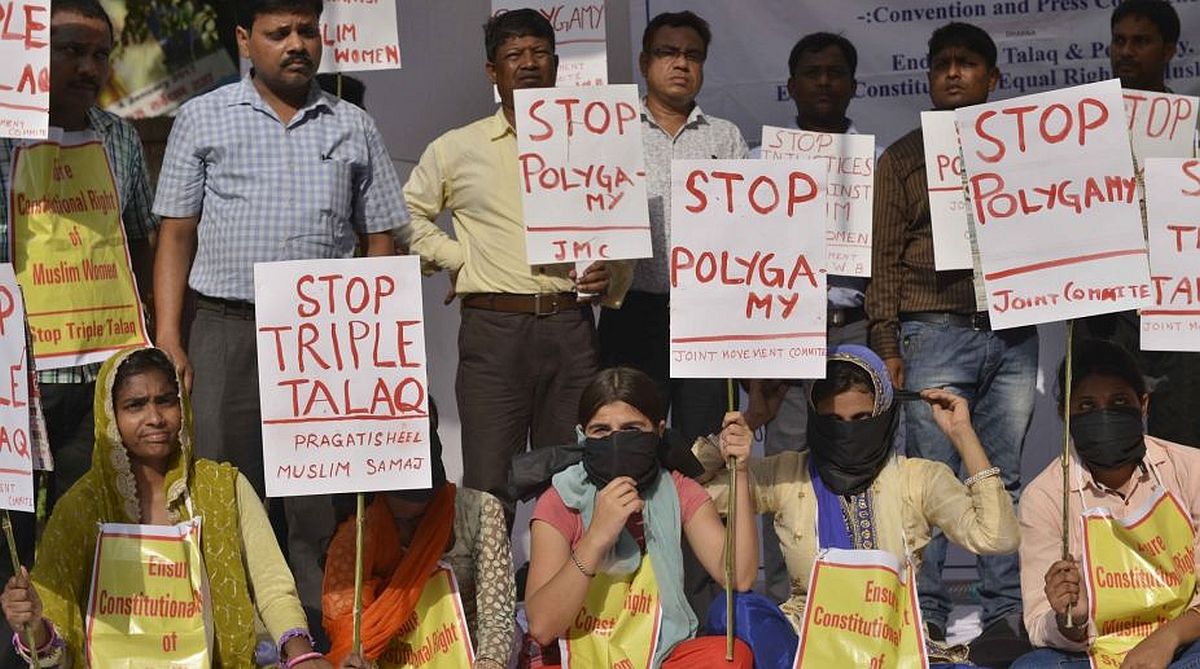Lok Sabha Election 2024, Phase 1: Voting on 102 seats underway
In the first phase of Lok Sabha elections 2024, as many as 102 constituencies spanning across 21 states and Union Territories will elect their new MPs.
The Union Cabinet had earlier on Tuesday gave its nod to reissue the contentious Triple Talaq ordinance, which makes the practice of instant triple talaq by Muslim men a penal offence.

Members of Pragatisheel Muslim Samaj stage a demonstration against triple talaq at Jantar Mantar in New Delhi. (Photo: IANS/file)
President Ram Nath Kovind on Thursday promulgated the Muslim Women (Protection of Rights on Marriage) Second Ordinance, 2019 to give continued effect to the provisions brought in by Muslim Women (Protection of Rights on Marriage) Ordinance, 2019.
The second ordinance declares the practice of triple talaq to be void and illegal and makes it an offence punishable with imprisonment up to three years and fine.
The Union Cabinet had earlier on Tuesday given its nod to reissue the contentious Triple Talaq ordinance, which makes the practice of instant triple talaq by Muslim men a penal offence.
Advertisement
A bill which seeks to make the practice of talaq-e-biddat void is pending in Rajya Sabha following continuous protests by opposition parties. The bill will lapse on June 3 with the dissolution of the present Lok Sabha.
Opposition parties and some community leaders have claimed that jail term for a man for divorcing his wife is legally untenable. The government has asserted that it provides justice and equality to Muslim women.
The government has promulgated the ordinance on triple talaq twice.
Under the Muslim Women (Protection of Rights on Marriage) Ordinance, 2019, divorcing through instant triple talaq will be illegal, void and would attract a jail term of three years for the husband.
A Bill to convert the earlier ordinance, issued in September 2018, was cleared by the Lok Sabha in December and was pending in the Rajya Sabha.
Since the Bill could not get parliamentary approval, a fresh ordinance was issued.
Seeking to allay fears that the proposed law could be misused, the government has included certain safeguards in it such as adding a provision of bail for the accused before trial.
These amendments were cleared by the Cabinet on August 29, 2018. While the ordinance makes it a “non-bailable” offence, an accused can approach a magistrate even before trial to seek bail.
In a non-bailable offence, bail cannot be granted by police at the police station itself. A provision has been added to allow the magistrate to grant bail “after hearing the wife”, the government had said.
The triple talaq bill was on the top of the government’s agenda as the winter session of Parliament commenced on December 11 last year.
The Modi government wanted to get the Parliament’s nod on the bill before the 2019 Lok Sabha polls.
The Supreme Court had in August 2017 declared “Triple Talaq” unconstitutional and in violation of Article 14 of the Indian Constitution, which provides for equality before the law and directed the government to enact a law on the issue.
(With agency inputs)
Advertisement